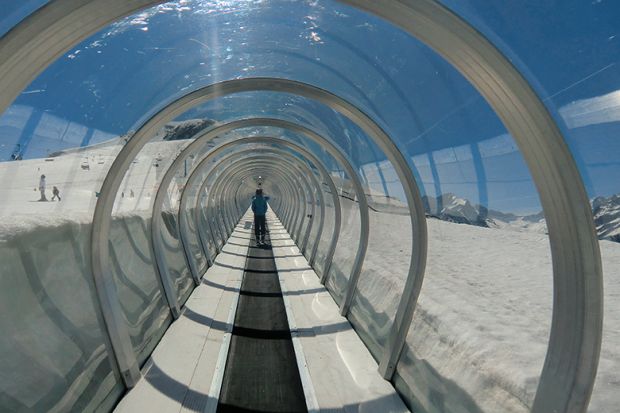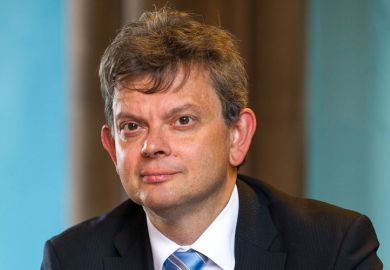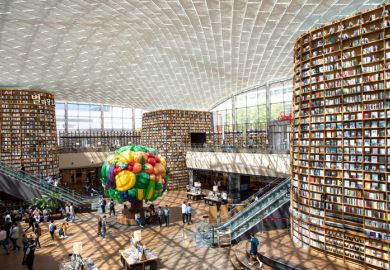A professor has resigned as the head of one of Canada’s leading interdisciplinary research centres, accusing the University of British Columbia of undercutting its mission of cultivating open-ended high-risk scientific exploration.
Philippe Tortell, a professor of earth, ocean and atmospheric sciences at UBC, quit as director of the Peter Wall Institute for Advanced Studies after being ordered to accept changes that he saw as replicating “top-down” funding systems that favour established scientists.
Those changes, Professor Tortell said, upended the basic point of the institute, created in 1991 with a C$15 million (£8.8 million) donation from Mr Wall. The Vancouver real estate magnate, according to UBC’s president at the time, David Strangway, wanted the venture “to generate new ideas and initiatives that wouldn’t happen otherwise”.
While traditional university scientists and their funders tend to hew to paths of incremental discovery, “we were the ones that took chances on people who had really strange ideas, but very provocative ideas”, Professor Tortell said.
The institute does that largely by creating a physical space in which researchers from different disciplines can spend time together and share ideas without pressure for time-specific outputs.
But at a meeting this summer of the institute’s five trustees and top UBC administrators – to which Professor Tortell said he was not invited – the board redirected much of the institute’s budget for open-ended basic research towards existing UBC funding channels.
The trustees, he said, also eliminated three important institute programmes – for sponsoring international conferences, for hosting distinguished visiting professors, and for a Wall Solutions Initiative that aims to convert research findings into solutions to real-world problems.
Overall, Professor Tortell said, the action by the five trustees – who include Mr Wall’s daughter Sonya and his nephew Bruno Wall, the current head of the family’s development company – cut or redirected about 75 per cent of the director’s discretionary budget authority. The vote, according to one trustee, was unanimous.
In a blog post announcing his departure, Professor Tortell wrote that he was “deeply troubled by this new approach” and warned that it “poses an existential threat to the institute’s core mission, academic independence and capacity to catalyse truly innovative and creative research”.
“I cannot, in good faith, continue to lead the institute towards a path with which I disagree profoundly, and one that I see as wholly inconsistent with its mission and mandate,” he said.
Santa Ono, UBC’s president, said that Professor Tortell’s resignation “was unexpected and is disappointing”.
At a meeting of the UBC faculty senate, Professor Ono said that he did not intend any major change in the institute’s mission but conceded that the process of adjusting the budget priorities “could have been handled better”, according to political scientist Maxwell Cameron, who along with Professor Ono serves on the institute’s five-member board of trustees.
Other trustees feel similarly, Professor Cameron said. “There was never any question of infringing on academic freedom, but rather different visions of the role of the institute,” he said. “It should have been possible to work those out, and we regret that did not happen.”
A UBC spokesman said that the closed trustees meeting was part of a year-long consultative process with Professor Tortell, in which he was asked for a strategic plan for the institute that more directly aligned with UBC’s objectives. At the time of that trustees meeting, Professor Tortell had produced a proposal that “moved in the direction suggested by the” trustees, but “was not financially sustainable”, the spokesman said.
Professor Tortell told Times Higher Education that the experience has left him concerned for the future of high-risk science at UBC.
“That’s a big part of what we do,” he said. “We allow people – in fact we encourage people – to fail, because if you don’t fail, you’re not really trying that hard.”
POSTSCRIPT:
Print headline: Director exits in ‘top-down’ funding row
Register to continue
Why register?
- Registration is free and only takes a moment
- Once registered, you can read 3 articles a month
- Sign up for our newsletter
Subscribe
Or subscribe for unlimited access to:
- Unlimited access to news, views, insights & reviews
- Digital editions
- Digital access to THE’s university and college rankings analysis
Already registered or a current subscriber? Login








